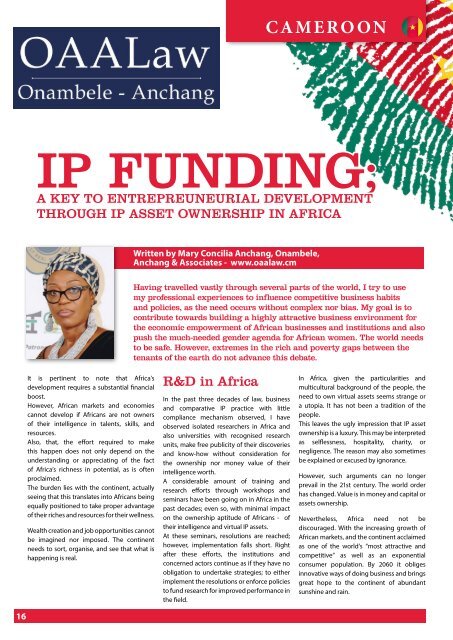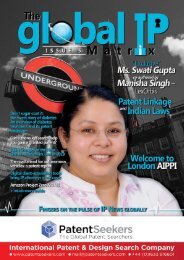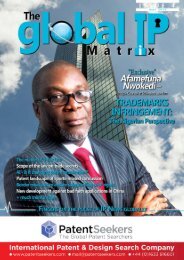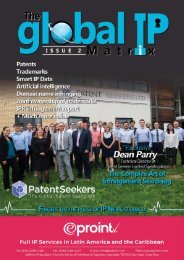The Women's IP World Annual 2019/2020
We are delighted to present you with the launch edition of The Women’s IP World Annual 2019/2020, celebrating women at all levels working in IP Law and Innovation. From the very beginning, the response and feedback we had was amazing, and we would like to thank all of the incredible women involved. Our aim was to celebrate a group of diverse women, from all over the globe, showcasing their achievements and also their personalities to inspire and inform. We have taken an unbiased approach and kept the articles & profiles as authentic as possible, to keep the author's own personal style. This has resulted in a cocktail of inspirational women coming together to share thoughts, ideas, and experience positively. We hope you enjoy this issue as much as we have enjoyed putting it together. Ms. Elvin Hassan Editor & Head of International liaisons
We are delighted to present you with the launch edition of The Women’s IP World Annual 2019/2020, celebrating women at all levels working in IP Law and Innovation. From the very beginning, the response and feedback we had was amazing, and we would like to thank all of the incredible women involved. Our aim was to celebrate a group of diverse women, from all over the globe, showcasing their achievements and also their personalities to inspire and inform. We have taken an unbiased approach and kept the articles & profiles as authentic as possible, to keep the author's own personal style. This has resulted in a cocktail of inspirational women coming together to share thoughts, ideas, and experience positively. We hope you enjoy this issue as much as we have enjoyed putting it together.
Ms. Elvin Hassan
Editor & Head of International liaisons
You also want an ePaper? Increase the reach of your titles
YUMPU automatically turns print PDFs into web optimized ePapers that Google loves.
<strong>IP</strong> FUNDING;<br />
A KEY TO ENTREPREUNEURIAL DEVELOPMENT<br />
THROUGH <strong>IP</strong> ASSET OWNERSH<strong>IP</strong> IN AFRICA<br />
It is pertinent to note that Africa’s<br />
development requires a substantial financial<br />
boost.<br />
However, African markets and economies<br />
cannot develop if Africans are not owners<br />
of their intelligence in talents, skills, and<br />
resources.<br />
Also, that, the effort required to make<br />
this happen does not only depend on the<br />
understanding or appreciating of the fact<br />
of Africa’s richness in potential, as is often<br />
proclaimed.<br />
<strong>The</strong> burden lies with the continent, actually<br />
seeing that this translates into Africans being<br />
equally positioned to take proper advantage<br />
of their riches and resources for their wellness.<br />
Wealth creation and job opportunities cannot<br />
be imagined nor imposed. <strong>The</strong> continent<br />
needs to sort, organise, and see that what is<br />
happening is real.<br />
Written by Mary Concilia Anchang, Onambele,<br />
Anchang & Associates - www.oaalaw.cm<br />
R&D in Africa<br />
In the past three decades of law, business<br />
and comparative <strong>IP</strong> practice with little<br />
compliance mechanism observed, I have<br />
observed isolated researchers in Africa and<br />
also universities with recognised research<br />
units, make free publicity of their discoveries<br />
and know-how without consideration for<br />
the ownership nor money value of their<br />
intelligence worth.<br />
A considerable amount of training and<br />
research efforts through workshops and<br />
seminars have been going on in Africa in the<br />
past decades; even so, with minimal impact<br />
on the ownership aptitude of Africans - of<br />
their intelligence and virtual <strong>IP</strong> assets.<br />
At these seminars, resolutions are reached;<br />
however, implementation falls short. Right<br />
after these efforts, the institutions and<br />
concerned actors continue as if they have no<br />
obligation to undertake strategies; to either<br />
implement the resolutions or enforce policies<br />
to fund research for improved performance in<br />
the field.<br />
CAMEROON<br />
Having travelled vastly through several parts of the world, I try to use<br />
my professional experiences to influence competitive business habits<br />
and policies, as the need occurs without complex nor bias. My goal is to<br />
contribute towards building a highly attractive business environment for<br />
the economic empowerment of African businesses and institutions and also<br />
push the much-needed gender agenda for African women. <strong>The</strong> world needs<br />
to be safe. However, extremes in the rich and poverty gaps between the<br />
tenants of the earth do not advance this debate.<br />
In Africa, given the particularities and<br />
multicultural background of the people, the<br />
need to own virtual assets seems strange or<br />
a utopia. It has not been a tradition of the<br />
people.<br />
This leaves the ugly impression that <strong>IP</strong> asset<br />
ownership is a luxury. This may be interpreted<br />
as selflessness, hospitality, charity, or<br />
negligence. <strong>The</strong> reason may also sometimes<br />
be explained or excused by ignorance.<br />
However, such arguments can no longer<br />
prevail in the 21st century. <strong>The</strong> world order<br />
has changed. Value is in money and capital or<br />
assets ownership.<br />
Nevertheless, Africa need not be<br />
discouraged. With the increasing growth of<br />
African markets, and the continent acclaimed<br />
as one of the world’s “most attractive and<br />
competitive” as well as an exponential<br />
consumer population. By 2060 it obliges<br />
innovative ways of doing business and brings<br />
great hope to the continent of abundant<br />
sunshine and rain.<br />
<strong>The</strong>re is a need to adopt<br />
appropriate strategies and<br />
policies to fund African<br />
research. <strong>The</strong> time is ripe<br />
and Now.<br />
Less than 20 percent of the technology used<br />
in Africa is not African owned. Worse still, it is<br />
not free for transfer. It is expensive.<br />
If Africans do not own <strong>IP</strong> assets, they may<br />
never make headway in capital and industry.<br />
Most Sub Saharan <strong>IP</strong> offices and markets<br />
depend on a significant <strong>IP</strong> importation market<br />
in products and services to survive in business.<br />
This weakens the economy. Whereas, as<br />
<strong>IP</strong> asset owners, African businesses could<br />
witness increased exportation to influence<br />
market standards and statistics in brands for<br />
goods and services.<br />
While it is evident that old money belongs<br />
to asset owners of yesterday, more virtual<br />
assets are yet to be owned today. If targeted<br />
by Africans, the scope of intelligence is<br />
immeasurable. <strong>The</strong> establishment may be<br />
accused of capitalism. However, the only way<br />
Africa can make an entry into new markets is<br />
by owning their intelligence. This provides<br />
added value and competitiveness in the<br />
marketplace. African businesses must be<br />
seen to own more and more titles in designs<br />
and models, trademarks, patents, labels,<br />
geographical indications, etc.<br />
When this happens, African’s can make an<br />
exciting inroad in the <strong>IP</strong> marketplace.<br />
As such, an opportunity for African <strong>IP</strong> experts<br />
to sort and export <strong>IP</strong> services abroad.<br />
Funding <strong>IP</strong> in Africa will open a floodgate<br />
of business ventures in a multitude of<br />
entrepreneurial activities for jobs and<br />
welfare creation in Africa through<br />
sustainable value chains.<br />
Funding for<br />
R&D<br />
Policymakers must oblige<br />
the budgets and efforts to<br />
finance R&D.This requires the<br />
involvement of specialists and<br />
experts. Funding will facilitate the<br />
creation of prototypes needed<br />
to validate innovative ideas and<br />
discoveries for new investment<br />
opportunities and potential<br />
markets.<br />
While it is evident that the<br />
establishment only recognises<br />
conventional articles and concepts for use,<br />
the urge for new concepts and markets<br />
remains unequivocal. However, the burden to<br />
change the order of things rests irrevocably<br />
on efforts to be made by the aspirant.<br />
(Africans)<br />
Once an unconventional idea meets<br />
the recognised norms as internationally<br />
approved, the value becomes evident and<br />
open to the world market rules for pricing<br />
within the supply and demand rules.<br />
This involves a lengthy and very costly<br />
process prior.<br />
<strong>The</strong> facts hitherto argue in favour of the<br />
unequivocal need to adequately fund Africa<br />
research. <strong>The</strong> paradigms and impact on<br />
Africa’s development potential will shift<br />
upwards if Africans own at least 30 percent<br />
of their intelligence in <strong>IP</strong> assets. By doing<br />
so, they should apply adapted solutions to<br />
African problems.<br />
R&D in Africa must be accompanied as is in<br />
other parts of the world. Africans should<br />
be able to protect their findings to become<br />
owners of their intelligence.<br />
Private institutions like <strong>The</strong> AFRICAN<br />
CHAMBER OF Trade &Commerce (ACC)<br />
through her advocacy platforms, seeks to<br />
channel Africa’s trade and industry through a<br />
shared federated vision.<br />
<strong>The</strong> target is to build adapted infrastructures<br />
to guarantee Africa’s economic development<br />
with an emphasis on <strong>IP</strong> asset ownership by<br />
Africans.<br />
<strong>The</strong> Role of <strong>IP</strong> for Africa’s Socio-economic<br />
development is critical. While vehicles<br />
like the ACC work with experts, inventors,<br />
businesses, and stakeholders to secure<br />
“sector-oriented inclusive business models<br />
to grow African markets, the need to fund<br />
research remains paramount.<br />
Competitiveness in value chains can only<br />
be experimented through entrepreneurial,<br />
innovative start-up initiatives for Africa’s<br />
economic growth. As asset owners, African<br />
markets will be more attractive with the<br />
potential and capacity to conquer new<br />
markets. Thus, owners and consumers of<br />
services and the tools they sell will result<br />
in African businesses and infrastructures<br />
witnessing substantial growth percentages.<br />
<strong>The</strong>re is, therefore, urgent need to redirect<br />
our policies and resources towards funding<br />
research and development in Africa.<br />
With Africans owning solutions for African<br />
problems, the socio-economic impact will be<br />
friendly and attractive with an even playing<br />
ground for Africans and their development<br />
partners.<br />
In all fairness, better welfare resides in<br />
the ability to offer competitive goods<br />
and services produced locally for local<br />
consumption.<br />
As signatories to several bilateral regional<br />
and international binding trade tools (<strong>The</strong><br />
recently ratified Continental Free Trade<br />
Agreement CFTA, AGOA, OMC, EPA, PCT,<br />
Madrid Agreement and Protocol, Paris<br />
Convention, ADPIC, <strong>The</strong> Bangui Laws, etc.)<br />
Africa may not take full advantage of these<br />
laws in the absence of <strong>IP</strong> asset ownership in<br />
exchange.<br />
If we consider that “ECONOMIC RIGHTS “are<br />
fundamental Human rights, Africa’s industrial<br />
development can no longer wait. This calls<br />
for institutional advocacy with skilled experts<br />
to address these concerns.<br />
In conclusion<br />
Knowledge ownership is something Africans<br />
have shied away from, for centuries.<br />
However, <strong>IP</strong> constitutes an integral part<br />
of African assets in virtual capital worth.<br />
Acquisitions should be considerably funded<br />
for African economies to witness prosperity<br />
from their cultural heritage, with Africans as<br />
owners of their talents in quality and value.<br />
Finally, the need to concert and<br />
forge reliable strategies for<br />
successful partnership initiatives<br />
to fund <strong>IP</strong> asset ownership in<br />
Africa is unequivocal. This should<br />
influence the pace and standards<br />
of business. <strong>The</strong> time is NOW not<br />
TOMORROW!<br />
16 17












